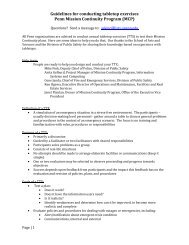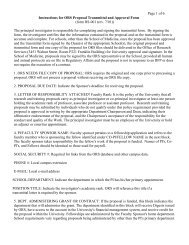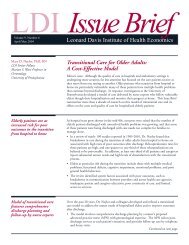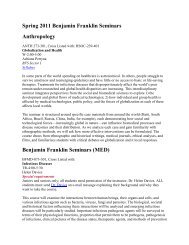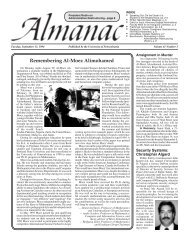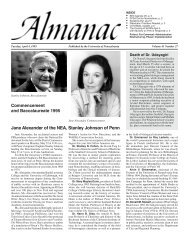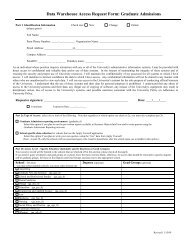2009-2010 COURSE REGISTER - University of Pennsylvania
2009-2010 COURSE REGISTER - University of Pennsylvania
2009-2010 COURSE REGISTER - University of Pennsylvania
You also want an ePaper? Increase the reach of your titles
YUMPU automatically turns print PDFs into web optimized ePapers that Google loves.
Seminar analyzing process <strong>of</strong><br />
archaeological excavation as a problem <strong>of</strong><br />
research design and method, stressing<br />
excavation as an integrated methodological<br />
system <strong>of</strong> research dealing with data<br />
retrieval, storage processing, integration<br />
and interpretation leading to final<br />
publication. Course intended for students<br />
proposing archaeological careers; it will be<br />
assumed participants have some practical<br />
excavation experience.<br />
SM 557. (AAMW557, LALS557)<br />
Seminar in Archaeological Theory<br />
and Method: Archaeology <strong>of</strong><br />
Landscapes. (M) Erickson.<br />
Prerequisite(s): ANTH 241 or 600 and one<br />
archaeology area course or permission <strong>of</strong><br />
instructor.<br />
Advanced seminar for potential<br />
pr<strong>of</strong>essional archaeologists. Course will<br />
examine critically main past and present<br />
theoretical issues in archaeological research<br />
and interpretation, and consider various<br />
methodologies utilized toward these<br />
interpretative ends.<br />
SM 577. Seminar: Problems in New<br />
World Prehistory. (M) Staff.<br />
Prerequisite(s): ANTH 241 or other course<br />
in New World Archaeology. May be<br />
repeated for credit.<br />
Selected research topics in New World<br />
archaeology, using the resources <strong>of</strong> the<br />
<strong>University</strong> Museum.<br />
SM 581. (ANTH281, SAST294,<br />
SAST594) Language, Race, and<br />
Ethnicity in South Asia: History and<br />
the Politics <strong>of</strong> Culture. (C) Mitchell.<br />
How has India maintained itself as a nation<br />
containing 1/6 <strong>of</strong> the world's population by<br />
recognizing 22 <strong>of</strong>ficial languages and<br />
scores <strong>of</strong> mother tongues Why have other<br />
South Asian countries broken into conflict<br />
over linguistic differences This course<br />
examines the shaping <strong>of</strong> ethnic, racial, and<br />
linguistic categories <strong>of</strong> identity in modern<br />
South Asia, and explores the socio-political<br />
movements that have emerged in<br />
conjunction with these categories. Topics<br />
include colonial administrative practices<br />
such as the decennial censuses and the<br />
Linguistic Survey <strong>of</strong> India; the rise <strong>of</strong><br />
regional linguistic movements; the<br />
relationships between language, ethnicity,<br />
and the writing <strong>of</strong> history in the context <strong>of</strong><br />
ethnic conflicts in Lanka; the Dravidian,<br />
Non-Brahmin, Adi-Dravida, and anti-Hindi<br />
movements in southern India; the creation<br />
<strong>of</strong> Pakistan and Bangladesh; and recent<br />
debates over the origins <strong>of</strong> the Aryans.<br />
SM 600. Contemporary Archaeology<br />
in Theory. (C) Staff. First-year<br />
anthropology graduate students.<br />
This graduate seminar addresses<br />
contemporary anthropological archaeology<br />
and considers the varied ways inferences<br />
are made about past and present human<br />
behavior from the archaeological record. It<br />
reviews such fundamental topics as the use<br />
<strong>of</strong> analogy, Middle Range theory,<br />
symbolism and meaning, social and cultural<br />
evolution, ideology and power, feminism<br />
and gender, and indigenous (non-Western)<br />
perspectives. It also foregrounds basic<br />
issues regarding heritage, looting, and<br />
ethics.<br />
602. Fundamentals <strong>of</strong> Physical<br />
Anthropology. (C) Schurr. First-year<br />
anthropology graduate students. This<br />
course is an introduction to the study <strong>of</strong><br />
human evolution through a survey <strong>of</strong><br />
evidence from the various subfields <strong>of</strong><br />
physical anthropology. Special attention<br />
will be paid to current issues and problems<br />
in these subfields, and the different ways in<br />
which researchers are attempting to<br />
understand and uncover the details <strong>of</strong><br />
human evolution. Among the ares <strong>of</strong><br />
inquiry to be covered in this course include<br />
paleoanthropology, primatology, human<br />
biology, molecular anthropology, and<br />
evolutionary biology. Some specific issues<br />
to be explored will include the primate<br />
roots <strong>of</strong> human behavior, brain and<br />
language evolution, new fossil hominids,<br />
the origina <strong>of</strong> anatomically modern<br />
humans, and human biogenetic variation.<br />
SM 603. (COML603) Language in<br />
Culture and Society. (C) Agha. Firstyear<br />
anthropology graduate students.<br />
First-year anthropology graduate students<br />
or Instructor Permission. Examination <strong>of</strong><br />
properties <strong>of</strong> human language which enable<br />
social persons to interpret the cultural<br />
world and to act within it. Topics include<br />
principles <strong>of</strong> lexical and grammatical<br />
organization; the role <strong>of</strong> language structure<br />
(grammar) and linguistic context<br />
(indexicality) in discursive activity;<br />
referential uses <strong>of</strong> language; social<br />
interaction; markers <strong>of</strong> social role and<br />
criteria by which models <strong>of</strong> linguistic form<br />
and function are formulated and on the<br />
empirical limits within which different<br />
models have explanatory value.<br />
SM 605. (COML605, FOLK605,<br />
MUSC605) Anthropology <strong>of</strong> Music.<br />
(C) Staff.<br />
Theories and methods <strong>of</strong> the<br />
ethnomusicological approach to the study<br />
<strong>of</strong> music in culture, applied to selected<br />
ANTHROPOLOGY<br />
western and non-western performance<br />
contexts.<br />
606. (EDUC602) Youth Cultural<br />
Formations. (M) Lukose.<br />
This course explores anthropological<br />
perspectives on peer-based youth cultures.<br />
It explores how educational institutions,<br />
media (fashion, music, magazines), and<br />
states shape youth cultures in cross-cultural<br />
contexts through social processes such as<br />
capitalism, nationalism, and increasing<br />
globalization. The course emphasizes<br />
ethnographies and histories which explore<br />
the relationship <strong>of</strong> these wider social<br />
processes to the lived realities <strong>of</strong> young<br />
people, situated in class, gender, national<br />
and race-specific contexts.<br />
SM 617. (COML617) Contemporary<br />
Approaches to the Study <strong>of</strong> Culture<br />
and Society. (C) Staff. First-year<br />
anthropology graduate students.<br />
A critical examination <strong>of</strong> recent history and<br />
theory in cultural and social anthropology.<br />
Topics include structural-functionalism;<br />
symbolic anthropology; post-modern<br />
theory. Emphasis is on major schools and<br />
trends in America, Britain, and France.<br />
620. Directed Reading and Research.<br />
(C) Staff. May be repeated for credit.<br />
To be arranged only by consultation with<br />
academic adviser and faculty member(s) to<br />
be involved; a proposed syllabus must be<br />
presented for approval, and written papers<br />
will be required without exception. On<br />
approval <strong>of</strong> these papers one copy must be<br />
presented to the Department <strong>of</strong><br />
Anthropology <strong>of</strong>fice for filing.<br />
621. Directed Field Training and<br />
Research. (C) Staff. May be repeated for<br />
credit.<br />
To be arranged only by consultation with<br />
academic adviser and the faculty<br />
member(s) to be involved; a proposed<br />
syllabus must be presented for approval and<br />
written papers will be required without<br />
exception. On approval <strong>of</strong> these papers,<br />
one copy must be presented to the<br />
Department <strong>of</strong> Anthropology <strong>of</strong>fice for<br />
filing.<br />
SM 622. Topics in Physical<br />
Anthropology: Human Life History.<br />
(M) Valeggia.<br />
Humans are characterized by several<br />
distinctive life history features, e.g. large<br />
babies, late age at puberty and first<br />
reproduction, cessation <strong>of</strong> menstruation<br />
long before death, and a long life span. In<br />
addition, our reproductive decisions are<br />
heavily influenced by society and culture.<br />
This seminar will explore human life<br />
Page 33





